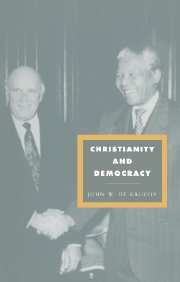Book contents
- Frontmatter
- Contents
- General editors' preface
- Acknowledgements
- Introduction
- PART I THE SYSTEM AND THE VISION
- PART II HISTORICAL AND THEOLOGICAL CONNECTIONS
- PART III CHURCHES AND THE STRUGGLE FOR DEMOCRACY
- 5 Civil rights and liberation in the Americas
- 6 The post-colonial struggle for democracy in sub-Saharan Africa
- 7 Midwives of democracy in East Germany and South Africa
- PART IV CRITICAL THEOLOGICAL REFLECTION
- Select bibliography
- Index of names
- Index of subjects
- Cambridge Studies in Ideology and Religion
7 - Midwives of democracy in East Germany and South Africa
Published online by Cambridge University Press: 21 January 2010
- Frontmatter
- Contents
- General editors' preface
- Acknowledgements
- Introduction
- PART I THE SYSTEM AND THE VISION
- PART II HISTORICAL AND THEOLOGICAL CONNECTIONS
- PART III CHURCHES AND THE STRUGGLE FOR DEMOCRACY
- 5 Civil rights and liberation in the Americas
- 6 The post-colonial struggle for democracy in sub-Saharan Africa
- 7 Midwives of democracy in East Germany and South Africa
- PART IV CRITICAL THEOLOGICAL REFLECTION
- Select bibliography
- Index of names
- Index of subjects
- Cambridge Studies in Ideology and Religion
Summary
The fall of the Berlin Wall in 1989 and the first post-apartheid democratic elections in South Africa in 1994, are now widely regarded as epoch-making events at the turn of the century and symbols of the emerging new world order. It is appropriate then that our two concluding case studies should take us back to the opening comments in our Introduction, and focus on the role of the churches as midwives of democratic transition and reconstruction in Germany and South Africa.
Comparisons between Germany and South Africa have been made previously with regard to Nazism and apartheid. In many respects the church struggle against apartheid was as inspired by the German Kirchenkampf against Hitler as it was by the Civil Rights movement in the United States. But, just as in those instances it was inappropriate to make simplistic comparisons, so it is with regard to the transition to democracy in Germany and South Africa today.
While in both Germany and South Africa there has been a rejection of totalitarian and authoritarian regimes followed by the attempt to establish democratic social orders, the two cases cannot be equated. In East Germany the revolutionary change was from an anti-Christian totalitarian Communism towards a liberal democratic capitalist social order in a relatively homogeneous cultural context. In multi-cultural South Africa, by way of contrast, the transition has been from a virulently anti-Communist, right-wing racist social order, which was overtly Christian in its claims, to a non-racial democracy in which members of the Communist Party play an important part in government.
- Type
- Chapter
- Information
- Christianity and DemocracyA Theology for a Just World Order, pp. 193 - 224Publisher: Cambridge University PressPrint publication year: 1995



